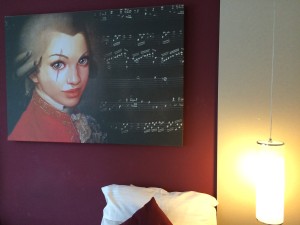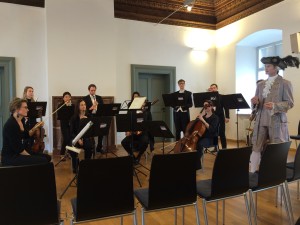Why we do it
 I am sitting in a room. It’s not just any room. It’s the historic Kuenburg Hall at the New Residenz in the center of Salzburg. I am listening to Mozart performed by the Mozart Players in the city of Mozart’s birth. His statue dominates the courtyard. His “birth house” is just down the street.
I am sitting in a room. It’s not just any room. It’s the historic Kuenburg Hall at the New Residenz in the center of Salzburg. I am listening to Mozart performed by the Mozart Players in the city of Mozart’s birth. His statue dominates the courtyard. His “birth house” is just down the street.
I am not a classical music aficionado, but you don’t have to be to love Mozart. The guy knew how to write a tune. I don’t usually attend classical music concerts, but here in Mozart-besotted Salzburg how could I not? The room, despite its pedigree, is simple, plain except for the wood-carved frieze on the ceiling and the elegant 12-foot tall windows facing out to the courtyard. The audience is seated on folding chairs. The twelve players are seated on folding chairs. They are, at most, fifteen feet from me, so close that during the French horn solo I can hear the musician’s in-take of breaths.
They play. Man, do they play. They play with all the energy and exuberance that the music demands. They play with a combination of intense concentration and dreaminess, of both working their craft and transcending it. I’ve seen this in the faces, in the bodies, of ballet dancers. I’ve felt it in myself during those moments in the zone where “working” is not really what I’m doing.
The sound is luscious and alive and everywhere. I alternate between closing my eyes because I only want sound, nothing else, and closely observing the musicians, watching their faces, deciphering their body language.
Here’s why I’m studying them so intently: These extraordinary musicians at the top of their game are playing for an audience of eleven people. There are more musicians than there are audience members. And I see in their faces and in their bodies that they don’t care. Of course they want people to listen, just like I want people to read my books, but that’s not why they perform. They do it for the love of the music, for the joy of playing, for the now-ness of the performance.
Do they hold back because they are playing to an almost empty room? No. Do I write a lesser book because I get a lower advance? No. I do what I do, they do what they do, because it’s what we do. It is what we love. It is about the thing itself. The beautiful thing. It is good to be reminded of this.
And it is necessary to be reminded of this in an art and literature world that often seems to be dominated by numbers — attendance records, revenue earned, books sold, even, Lord help us, twitter followers. Please let us not forget the joy in the act itself.







0 comments
Kick things off by filling out the form below.
Leave a Comment